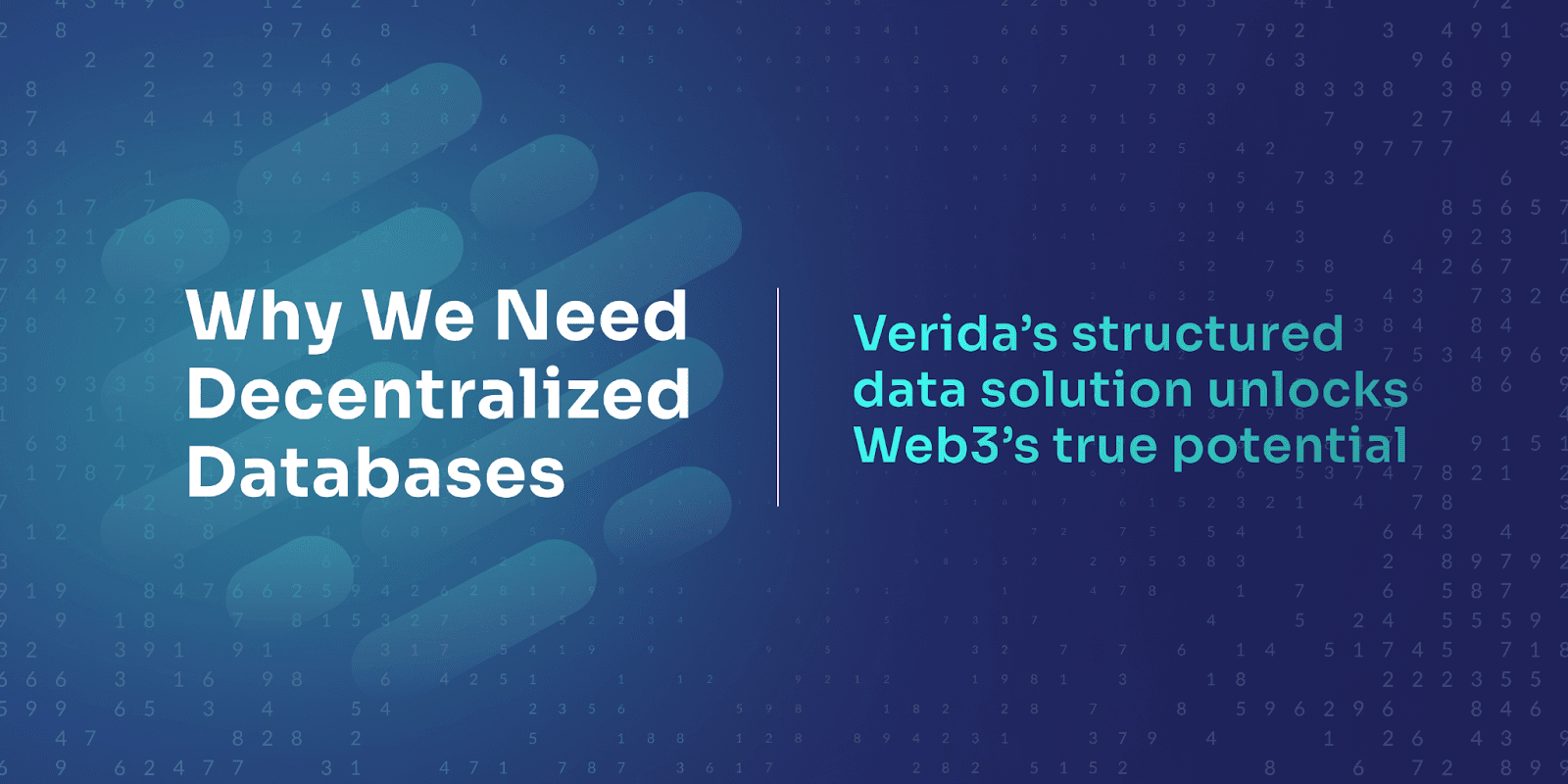Why We Need Decentralized Databases

Verida’s structured data solution unlocks Web3’s true potential
With our files, identities, and applications being stored in centralized cloud services, we have very little assurances on how our information is managed and secured. Code is rarely open-source, while our data is often encrypted in transit only, not end-to-end, allowing for decryption of data on the server side. With innumerable services being offered for free, it’s no wonder we’re constantly bombarded by big brother style adverts online. Not to mention the never-ending risk of data hacks.
Centralized data storage is convenient and efficient, but is far from perfect and has some obvious shortcomings:
- Data censorship: Is it really your data once it’s controlled by someone else?
- Limited competition: How many providers would you trust with your data?
- Data treasure troves: The larger the service, the higher the incentive for hackers to break in.
- Opaque policies: Does anyone really know how their data is secured?
Decentralizing data storage offers a solution to these challenges, but it’s easier said than done.
Advantages of decentralizing data
Despite the tradeoff with centralized efficiency, there are still numerous advantages to decentralizing our data:
- Redundancy: Replicating data across multiple devices makes it close to impossible for information to be lost.
- Availability: Storing data across numerous nodes makes it widely available and less prone to outages.
- Authenticated decryption: Strict cryptographic procedures ensure that end-to-end encrypted information can only be decrypted, modified and accessed by private key owners, or the accounts they authenticate.
- Verification: Actions such as uploads, copies, and edits, can be cryptographically verified to ensure data has not been tampered with.
- Decreased security risk: Shifting access control from centralized entities to individual owners reduces the hacking risk for storage companies.
- Censorship resistance: Users are free to read, write and own their data, without the fear of losing access or having content deleted.
- True ownership: Most importantly, users can be assured that their data is accessible for the lifetime of the decentralized protocol, removing the risk of being locked out by a centralized storage provider.
Decentralized databases
Whereas decentralized storage facilities have been around for several years (think IPFS, Arweave, Storj), decentralized databases have proven much harder to build.
Ironically, much of the infrastructure powering the decentralized Web3 movement resorts at some level or another to centralized database solutions. While they may be familiar and reliable tools for application developers, centralized databases aren’t a perfect fit for decentralized applications. This is due to their inherent lack of interoperability, composability and sovereign data ownership.
Only by building truly decentralized databases, can Web3’s promise of self-sovereignty be fulfilled. Integrating structured data into the Web3 ethos requires a new technology stack, introducing concepts such as decentralized identity management, authentication, messaging, and private storage, while removing dependence on centralized entities.
Shared data schemas can increase interoperability and expedite the iteration of decentralized applications, similar to how smart contract building blocks enabled crypto’s DeFi and NFT sectors to flourish.
Giving developers access to decentralized databases opens the door to new use cases in crypto and beyond. Users within sectors such as gaming and social media could benefit from sovereign ownership of their assets and content, while projects and protocols in areas such as decentralized science (DeSci) and artificial intelligence could benefit from the security and assurances of decentralized databases.
The emerging DePIN sector generates an immense amount of data through the antennas, sensors and other hardware units that contribute to its various decentralized physical infrastructure networks. A truly decentralized database would help offload the data bloat from these services, while also adding to their composability and interoperability.
Verida unlocks Web3’s true potential
Verida’s open-source protocol brings structured data to the world of Web3. In doing so, Verida opens the door to data portability, breaking free from the data silos known not only in Web2, but which are becoming increasingly commonplace in web3.
Verida’s decentralized storage node infrastructure provides an ecosystem of encrypted databases where access is defined by public/private key pairs and W3C standard decentralized IDs (DID), a verifiable credential format that is central to the EU’s upcoming Digital Identity Wallet initiative.
Authentication, client-side end-to-end encryption and user-defined access control puts individuals in firm control of their private data, while enabling them to participate safely in new and exciting decentralized applications. Thanks to the intricate level of regional control, users from around the world can opt to store and share their information in specific territories, keeping in line with strict regulatory requirements such as GDPR.
The future is bright for Web3 data
Decentralized databases provide the framework that’s missing for a seamless migration from Web2 to Web3. Verida’s innovative solutions, from its underlying network to the user-facing wallet, offer a secure and streamlined pathway into the self-sovereign future.
To learn more about how Verida is doing this, visit: https://www.verida.network/learn
About Verida
Verida is a pioneering decentralized data network and self-custody wallet that empowers users with control over their digital identity and data. With cutting-edge technology such as zero-knowledge proofs and verifiable credentials, Verida offers secure, self-sovereign storage solutions and innovative applications for various industries. Verida’s ecosystem of KYC partners and technologies are ideally suited to help Kima expand into new markets, streamlining processes and efficiency for compliant transactions.
Verida Missions | X/Twitter | Discord | Telegram | LinkedIn | LinkTree